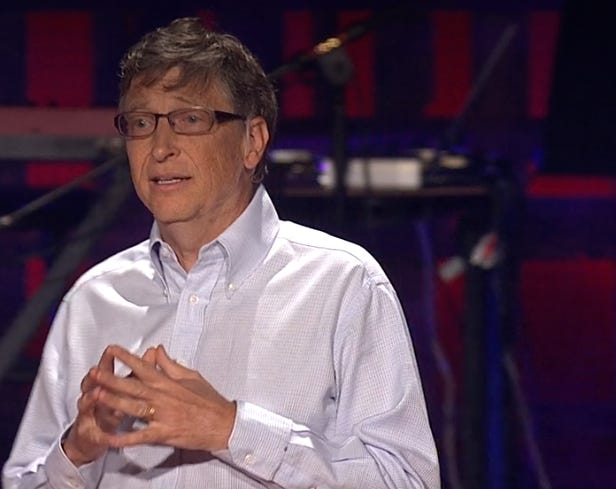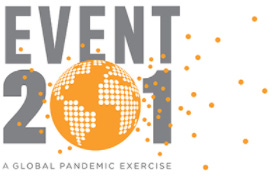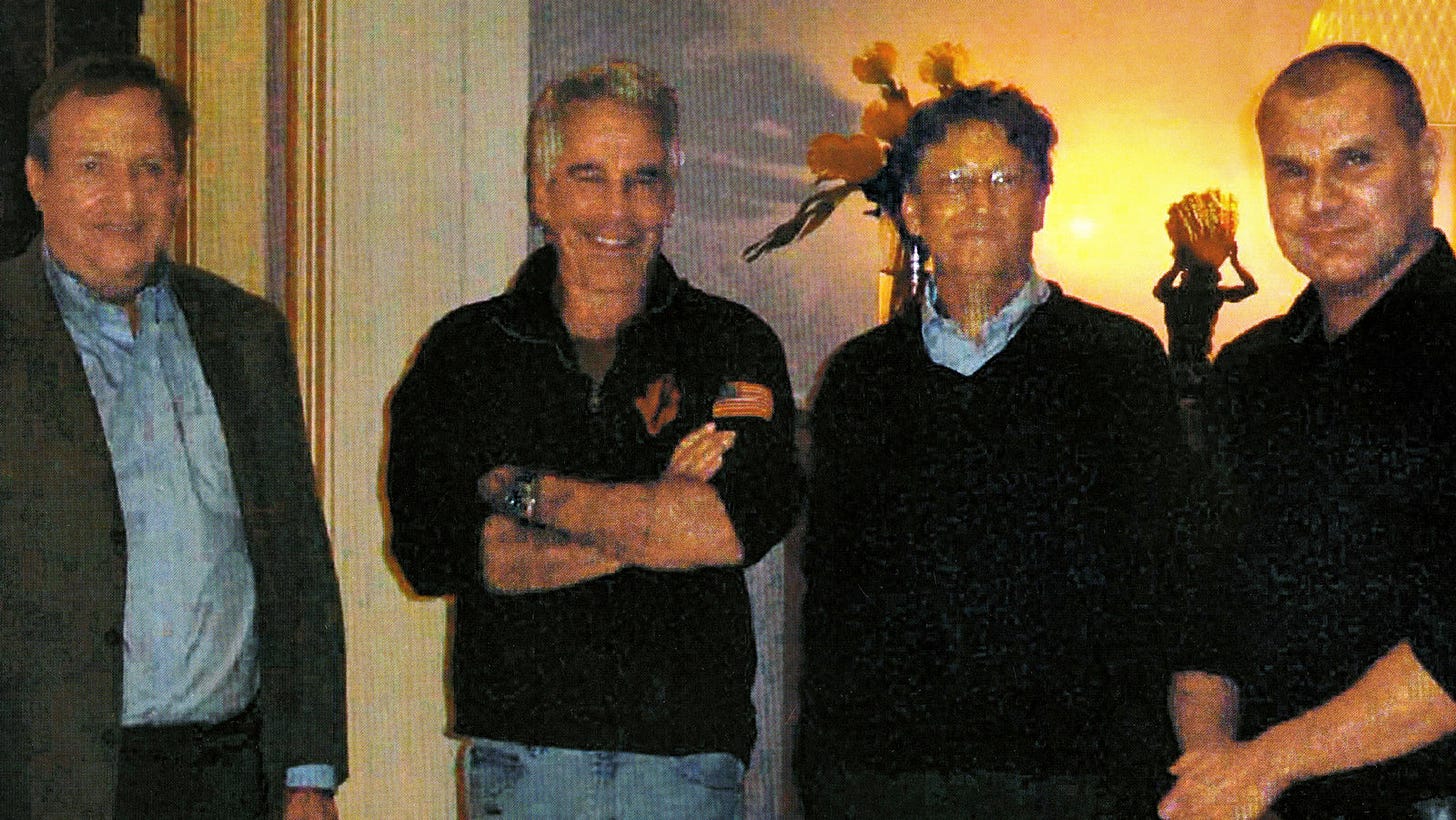The Trouble with Bill Gates
“The world today has 6.8 billion people. That's headed up to about nine billion. Now, if we do a really great job on new vaccines, health care, reproductive health services, we could lower that by, perhaps, 10 or 15 percent.”" - Bill Gates, Co-Founder of Microsoft
Let’s first address the easy-to-answer questions:
Is his net worth the problem? No, his net worth of around $134 billion is not the problem.
Is Microsoft the problem? No, the company he founded in 1975, Microsoft, is not the problem.
The trouble with Bill Gates is hard to explain, not because it’s difficult to comprehend, but because you have to look past the image that the mainstream press and philanthropic community have very generously created for him. While his wealth is not the direct problem, it has indeed allowed him both the means to push forward some very strange, very dangerous ideas, and it has also allowed him to establish for himself an almost untouchable mantle of “wisdom and knowledge.” What helps disguise some of his more questionable endeavors? Giving your money away to “good causes” is a classic form of misdirection.
Expert?
First, let’s knock out the easy truth. Bill Gates is not a doctor. Therefore he is not a coveted, almost mystical, '“expert.” As it stands, we have many, many scientists, epidemiologists, and people with other titles with which we’ve become very familiar over the last year. Bill Gates is a brilliant software developer who likes to read a lot. His wealth and philanthropy have given him a platform on which to speak.
Bill Gates, Sr.
Second, it’s important to look at Bill Gates’s father’s influence on him. Bill Gates, Sr. did many things in his life, one of which was being on the board of Planned Parenthood. While the role of Planned Parenthood and its source of funding will be debated until the end of time, it is important for our context to acknowledge that Planned Parenthood’s founder, Margaret Sanger, was an ally of the eugenics movement. In her words, “birth control is nothing more or less than the facilitation of the process of weeding out the unfit [and] of preventing the birth of defectives.”
“Family Planning” and Reproductive Health
Taking into account the influence from his father, it is interesting to see how involved Bill Gates has gotten into the issue of ‘family planning.’ There are many facets involved in this concept, but we can summarize the goals of family planning with this statement from the National Center for Biotechnology Information (NCBI):
Family planning is “the ability of individuals and couples to anticipate and attain their desired number of children and the spacing and timing of their births. It is achieved through use of contraceptive methods and the treatment of involuntary infertility”
Curiously, that quote once came from the World Health Organization’s website, but the link to the site now takes you straight to the WHO’s page titled, “Contraception.”
In May 1999, the Bill & Melinda Gates Foundation “committed $20 million to create the Bill & Melinda Gates Institute for Population and Reproductive Health at the Johns Hopkins University School of Public Health.” This institute continues its work today, and has received regular funding from the Foundation over the years.
Infamous TED Talk Comment
In February 2010, Bill Gates gave a TED Talk regarding “the world’s energy future.” During that speech, he made the following comment:
“The world today has 6.8 billion people. That's headed up to about nine billion. Now, if we do a really great job on new vaccines, health care, reproductive health services, we could lower that by, perhaps, 10 or 15 percent.”
Population Resource Center
It’s unclear what has happened to this nonprofit organization, but rest assured there are plenty of others that have popped up since. Regardless, in August 1999, the Bill & Melinda Gates Foundation released a statement with the headline, “Population Resource Center Receives a $1 Million Gift from Bill & Melinda Gates.” At the conclusion of the press release, we read the following: “The Population Resource Center is a nonprofit organization dedicated to the development of sound public policy by promoting the use of accurate population data and its analysis in the decision-making process.” Interesting.
Event 201
This one is perhaps the most interesting of Bill Gates’s associations, in light of this last year of the Covid-19 hysteria. On Friday, October 18, 2019, Bill Gates was one out of about 130 people in attendance at an event called Event 201. Per the event website:
“Event 201 was a 3.5-hour pandemic tabletop exercise that simulated a series of dramatic, scenario-based facilitated discussions, confronting difficult, true-to-life dilemmas associated with response to a hypothetical, but scientifically plausible, pandemic.”
Of particular interest is the set of seven recommendations made by the group at the event’s conclusion. Recommendation #4: “Governments should provide more resources and support for the development and surge manufacturing of vaccines, therapeutics, and diagnostics that will be needed during a severe pandemic.”
Here is the description of the “Event 201 Scenario”:
“Event 201 simulates an outbreak of a novel zoonotic coronavirus transmitted from bats to pigs to people that eventually becomes efficiently transmissible from person to person, leading to a severe pandemic. The pathogen and the disease it causes are modeled largely on SARS, but it is more transmissible in the community setting by people with mild symptoms.”
Jeffrey Epstein
Last but not least, Jeffrey Epstein. The connection between the two has now been pretty-well hashed out, but it’s worth still summarizing. As we know, Epstein seems to have been acquainted with many of the movers and shakers of the American elite.
Gates on Epstein: “His lifestyle is very different and kind of intriguing although it would not work for me.”
Epstein on Gates: “Bill’s great.”
Rave reviews!
As a strange addition to everything else, Bill Gates supposedly had an ulterior motive in his association with Jeffrey Epstein: winning the Nobel Peace Prize!
Concluding Thoughts
Bill Gates is the creator of many products, and as a daily computer user, I owe much to him. But he is also the type of person toward whom we should have a natural skepticism. Anyone in power, whether in government or in a position which highly influences politicians, deserves a high level of scrutiny. Bill Gates seems to have adopted many old-fashioned ideas regarding the earth’s limited resources and the number of people on earth who are able to flourish in such a scenario. This leads to an entirely different discussion, and it’s a scary one. Often when confronted with a lot of these ideas, the next question out of Bill Gates’s defenders mouths is shocking: “Is limiting the Earth’s population so bad? Maybe Thanos had it right. Have you looked out at the world we inhabit?”

Regards,
John
Further resources and similar content for your deep, dark spiral down the rabbit hole:
An Essay on the Principle of Population - Thomas Malthus
Humans, Energy, and the Texas Freeze - Madness of Crowds
Julian Simon on the ‘Ultimate Resource’ (human ingenuity, the cascading resource) - Robert Bradley
Julian Simon on Resources, Growth and Human Progress
The Human Mind is Our Most Precious Commodity - Marian Tupy
A Humanist Approach to Environmental Issues - Alex Epstein








